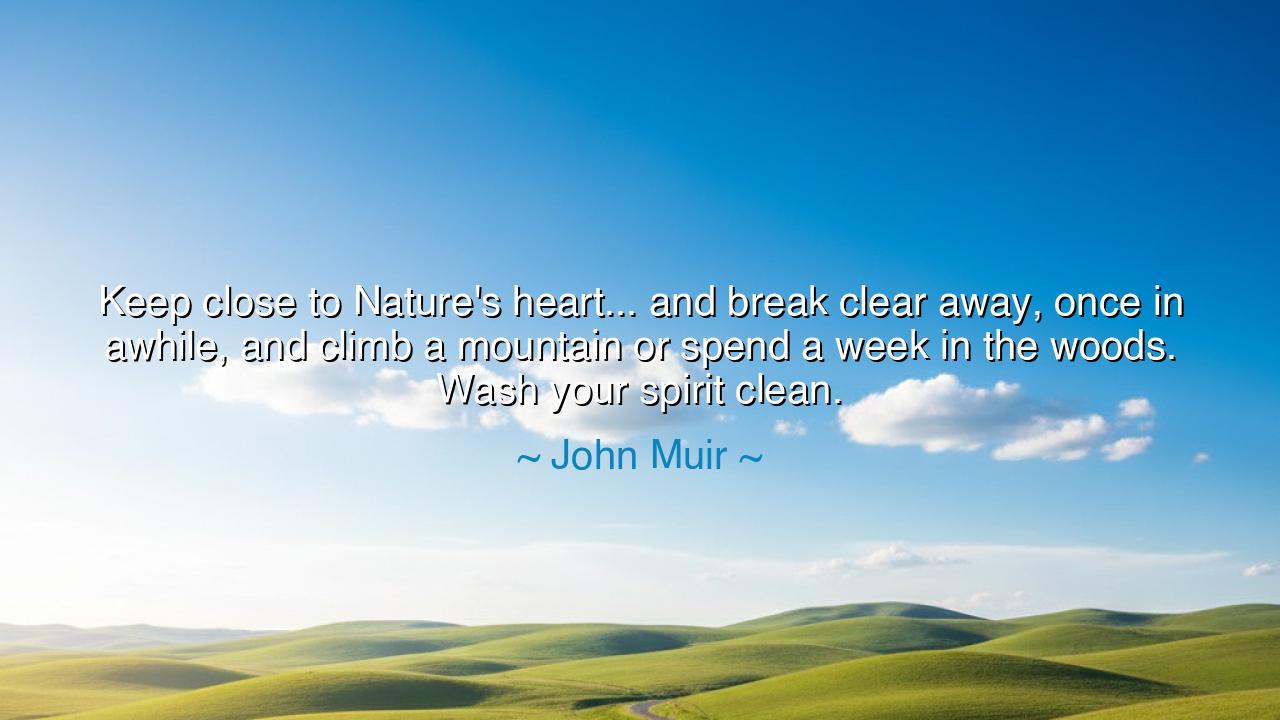
Keep close to Nature's heart... and break clear away, once in
Keep close to Nature's heart... and break clear away, once in awhile, and climb a mountain or spend a week in the woods. Wash your spirit clean.






When John Muir said, “Keep close to Nature’s heart... and break clear away, once in awhile, and climb a mountain or spend a week in the woods. Wash your spirit clean,” he spoke as a prophet of the wild — a voice calling humankind back to its origin. His words were not merely advice for recreation; they were a summons to spiritual renewal. Muir understood that civilization, in all its comfort and noise, corrodes the soul when it cuts us off from the living Earth. To keep close to Nature’s heart is to stay near the pulse of creation — to remember that the same wind that bends the trees once stirred the breath of our ancestors, and the same rivers that carve the mountains still carry the echo of eternity.
In his time, Muir walked the untamed lands of America when they were still vast and free. He wandered through the Yosemite Valley, slept beneath the stars, and found in every stone and leaf a living sermon. His spirit was formed by wilderness, and his writings became sacred hymns to the mountains and forests he loved. He believed that the human spirit, weary from the burdens of greed and industry, could be healed only by returning to nature’s simplicity. To wash your spirit clean meant not just to breathe fresh air, but to purge the soul of fear, vanity, and the sickness of endless striving. Nature, to Muir, was both temple and teacher — a cathedral of silence where one could hear the voice of the divine.
Throughout history, those who sought truth have gone into the wilderness to find it. Moses climbed Mount Sinai to meet the voice of God. Buddha sat beneath the Bodhi tree until enlightenment dawned. Jesus retreated into the desert to fast and pray. The pattern is eternal: the farther one travels from the noise of the world, the closer one comes to truth. In solitude, surrounded by wind and stone and star, the illusions of the ego fall away. That is what Muir meant when he said, “break clear away” — to leave behind the burdens of the mind and rediscover the purity of being alive. The mountain becomes not merely a place, but a metaphor for the ascent of the soul.
Muir himself was a living embodiment of this truth. Born in Scotland and raised in the harsh fields of Wisconsin, he labored from dawn to dusk as a young man, until a factory accident nearly cost him his sight. In those long, dark days of blindness, he realized how precious the gift of vision was — not merely for the eyes, but for the heart. When his sight returned, he vowed to see the world anew, and he set out walking, often alone, through forests and across mountains. Those journeys were his rebirth. They cleansed him of despair and filled him with wonder. From them came his lifelong devotion to preserving the natural world — the founding of the Sierra Club, the creation of national parks, and a philosophy that saw divinity not in churches but in the living breath of the Earth itself.
To “keep close to Nature’s heart” is to stay close to one’s own. Muir knew that the Earth and the soul are reflections of the same mystery. The streams that flow through the mountains mirror the thoughts that flow through the mind. When those waters are polluted, both nature and spirit suffer. Thus, he urged all people — even those bound to cities and machines — to step away, if only for a time, and remember the source. In the wild, one learns humility. The mountains remind us of our smallness, the trees of patience, the rivers of persistence, the stars of eternity. These are lessons that no book can teach and no wealth can buy.
There is a quiet heroism in this teaching. It is not the heroism of conquest, but of return — the courage to let go, to listen, to simply be. To climb a mountain is to rise above the pettiness of daily concerns; to walk in the woods is to walk with the ancient wisdom of creation. In that stillness, the noise of the world fades, and what remains is the eternal heartbeat of life. That is the washing of the spirit — not through ritual or doctrine, but through communion with what is vast, living, and true.
The lesson is as clear as a mountain stream: to live well, one must remember to return. Return to the forest, to the sea, to the open air. Let your feet feel the earth, your lungs taste the wind, your eyes rest on horizons unbroken by walls. There, you will find again what the modern world forgets — peace without price, strength without arrogance, beauty without vanity. Do not wait for sickness or sorrow to remind you of what you have lost. Break clear away, as Muir said, before the heart grows heavy and the soul forgets its song.
And so, take this teaching as both call and comfort: when the world grows gray and the spirit grows weary, go to the mountains. Walk among the trees. Sit beside the waters. Wash your spirit clean. For the Earth is not merely where we live — it is who we are. To return to her is to return to ourselves, and in that returning, to be made whole once more.






AAdministratorAdministrator
Welcome, honored guests. Please leave a comment, we will respond soon